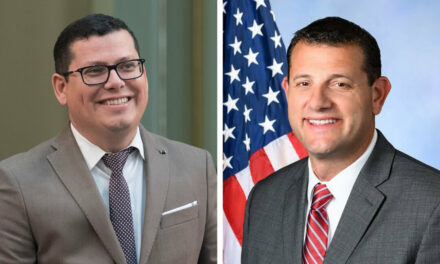We support our Publishers and Content Creators. You can view this story on their website by CLICKING HERE.
The president-elect recently proposed imposing a 10 percent temporary cap on credit card rates.
Sen. Bernie Sanders (I-Vt.) is open to working with President-elect Donald Trump and the incoming administration on capping credit card interest rates.
“While working Americans catch up, we’re going to put a temporary cap on credit card interest rates,” Trump said at a Long Island rally on Sept. 18. “We’re going to cap it at around 10 percent. We can’t let them make 25 and 30 percent.”
The policy would likely require congressional action.
Sanders, who recently secured another term in the upper chamber, said he looks forward to collaborating with the president-elect and his team on limiting credit card interest fees, calling current rates “usury.”
This is not the first time that Sanders has tackled the issue.
“The reality is that today’s modern-day loan sharks are no longer lurking on street corners breaking kneecaps to collect their payments,” said the Vermont independent at the time. “They wear three-piece suits and work on Wall Street, where they make hundreds of millions in total compensation.”
The banking industry has also opposed previous rate cap proposals.
A spokesperson for the American Bankers Association told The Epoch Times shortly after Trump’s announcement that these measures “would result in the loss of credit for the very consumers who need it most” and push consumers to alternative lending instruments that are less regulated and riskier.
However, lawmakers on both sides of the aisle have advocated reining in the industry’s practices.
Sen. Josh Hawley (R-Mo.) suggested capping rates at 18 percent as part of legislative efforts in September 2023.
“The government was quick to bail out the banks just this spring, but has ignored working people struggling to get ahead. Capping the maximum credit card interest rate is fair, common-sense, and gives the working class a chance.”
The current administration has also grappled with the credit card companies.
President Joe Biden first proposed a rule in February 2023 to cap credit card late fees at $8. However, a federal judge in Texas blocked the White House’s measure to restrict these companies from charging clients late fees higher than $8.
Financial experts anticipate gradually declining credit card interest rates since the Federal Reserve is unwinding its restrictive monetary policy stance. The Fed followed through on a quarter-point reduction to the benchmark federal funds rate to a range of 4.5 and 4.75 percent.
But while credit card interest rates are expected to fall in the coming months, they remain high because they have been near historic levels since early 2022.

 Conservative
Conservative  Search
Search Trending
Trending Current News
Current News 







